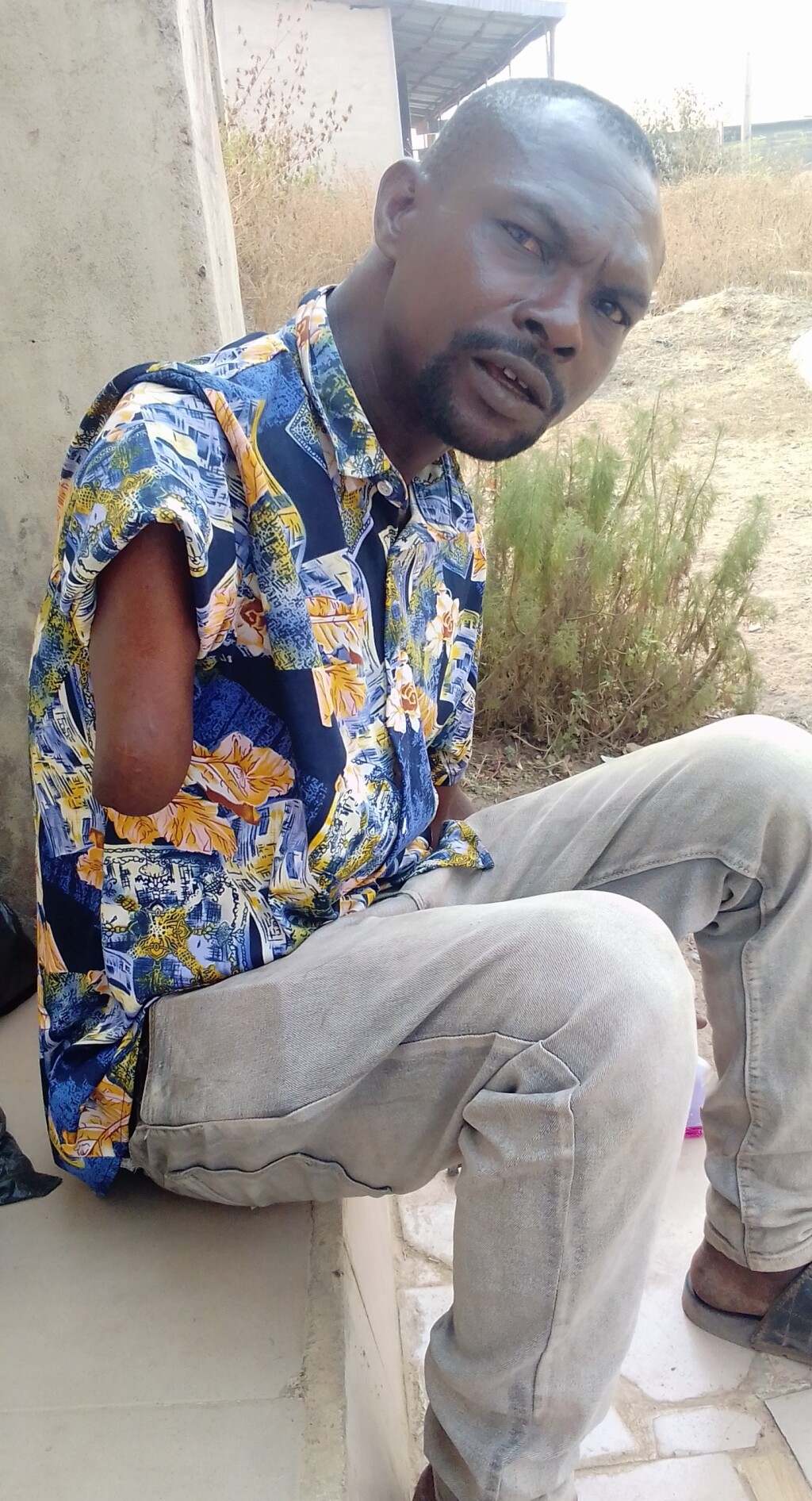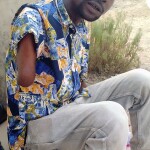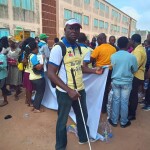They lost their limbs, and may soon lose their lives and others’—to make a living on the road in Oyo.
By Elijah Olusegun
As long as he breathes, Ade Haastrup is a cashcow for his two wives and six children. And to Agbala Otun, in Ona Ara LGA, he remains a darling, a menace barreling downhill on six wheels.
In earnestness, he slammed his all-purpose hand on the spirogyra-green bonnet of a truck deposited by the roadside. The vehicle clanged loose and broken. “Not many licensed drivers could have driven the way I did that day,” he said, his sandals crushing a web of finely broken pieces of green glass. The Bedford, nosed into a ditch, hunkered down on its two front wheels, the threads of their tyres smoothed over by years.
“I probably would have been in a cell now.”
Passers-by stopped and looked, and shook their heads at times; some called out to him. He snapped the hand off the bonnet each time, and waved the callers a high-five in the cold dusty air that diffused the mid-day sun. At his feet, two men screwed out the front left tyre, and asked for a tool. He moved close to lend them that same hand. In minutes, a jack groaned, and the truck rose, each click laden with stress.
It was his eighth truck so far. Inside, a crater where he uprooted the right-hand wheel gaped. Other holes peeped around the space the manufacturer originally designated as the dashboard. Ade sat breasting the steering that stuck out at 45 degree when he drove, his legs buried in the legroom choking with plastic containers. The elements already warped the speedometer dial; its screen and dust, too, had fused into one solid cataract.
Ade didn’t start out as a trucker, let alone as somebody who could drive blind. His cement block-making machine fly belt had ripped off his right arm March 3, 2010, landing him with an infected arm and a swollen chest at the University College Hospital, Ibadan. “They cut it in four places before they could stop the rot,” he said.
In Oyo, persons like Ade don’t have to burst their kidneys to earn a living if they can get behind the wheel. ER found out there are other amputees holding their own in public transportation and haulage business in the state, especially the capital city. Ade only set himself apart because of his recklessness: grafting a truck head with a right-hand drive into a rear platform, and driving more than one round trip daily. “When there are no mallahs to help load the sand, I dig the hole myself with a shovel and fill the truck,” he said. A trip from the quarry site on the Ibadan Airport property to the Agbala Otun tipper park took him between 30 minutes and one hour.
Derring-do apart, most of the Oyo amputees plying the road have similar experiences on their journey after disabilities. And ignorance seems a major milestone.
Immediately after acquisition of disabilities, experts agree there should be rehabilitation for a period of time. First, physiotherapy will ensure there’s cessation of pain, and improvement of movements and functions, according to Paul Egbo, the founder of Classic Physiotherapy Services, Lagos. “Then we have occupational therapy whose practitioners are not many in Nigeria. With assistive devices, they train the amputees how to fit back into their former life,” he told ER. Vocational training and empowerment could then follow.
Ade, however, said he never heard about rehabilitation—not even while he spent about a month at the UCH. The federal health institution has two rehab centres the Medical Rehabilitation Therapists Board of Nigeria (MRTBN) approves. Access might be no problem here, as long as any PWD can afford the medical bill.
ER asked Oyo’s physical disability cluster, which comprises amputees among others, how its members navigated life following their disabilities. The cluster’s head, Oyayinka Babawale, didn’t respond to that and other questions. His counterpart and chairman of the state Joint National Association of Persons with Disabilities (JONAPWD), Adesoyin Akibu, could talk of a place at Moniya for rehabilitation.
Although the Centre for Rehabilitation of Disabled Persons, Moniya, has been around since 1991, Ade never heard about it or its benefits. And it’s very likely the centre, which a state official said begs for attention, could have been of no help for rehabilitating adults who acquire their disabilities in their prime. The MRTBN does not even list it as an approved rehab facility.

With a population of about 100, the Moniya centre, during its first alumni anniversary last October, claimed it had been training youth with disabilities in skills acquisition, and integrating them to society. Akibu confirmed this. But vocational training and what experts call medical rehabilitation are two separate processes. And when properly followed, they provide two different benefits Ade, other amputees, and all PWDs in Oyo state deserve. Section 5(13) of the Oyo State Persons Living with Disability Law, 2017, provides for all that.
The law established the Oyo Agency for Persons with Disabilities to ensure “establishment and promotion of schools, vocational and rehabilitation centres for the development of persons living with disability.”
In reality, most don’t even know about the provisions. Yet the Agency has the responsibility to make the PWDs aware of these rights and privileges. Section 5 (1) and (18) provide for advocacy, education, and enlightenment campaign drive. Unfortunately, the agency has yet to pick up speed.
The JONAPWD leader rated the disability awareness level in the state as average. “But Gov. Seyi Makinde has appointed special advisers on disability matters across all the LGAs, led by his executive assistant on disabilities,” he said. From reports, what these appointees mostly do is represent the government at events, and amplify what it is donating and sharing and promising the PWDs. Like their mass recruitment into the state teaching commission; the donation of assistive devices, including braille equipment, wheelchairs, audio equipment, and others to special-need schools across the state; and prompt payment of social workers in the state’s civil service—all acts of Gov. Makinde’s large heart. That much was obvious following the money. Of the N561 million the Ministry of Women Affairs budgeted for PWDs in 2023, personnel and overhead took N170 million and N351 million respectively.
But the state’s disability law—just like its forebear the Discrimination Act 2018—takes disability affairs beyond the good-heartedness of whoever is in government. It empowers the Oyo PWDs to make demand on the government, based on the provisions embedded in the law’s 41 sections. These include funding, coordination of formulation and implementation of disability policies, enforcement, advocacy, intervention, empowerment, and others.

Following a transitory period of one year after its enactment, the law ought to have become enforceable by now, if it’s ever going to have a bite. The DG of the agency, however, cautioned it will be too early to judge in 2024. “We just signed the law in 2022,” said Ayodele Adekambi. His appointment came last November, following the establishment of the agency. Talking about funding and other provisions of the law in the last four years doesn’t even arise, he told ER in January. “I was only able to present our budget for the 2024 appropriation last week.” He was quick, though, to talk about his government’s do-gooding. “Oyo state is the only one throughout the federation that has the highest record of disability employment rate,” the former executive assistant on disability said. He asked the PWDs to give his agency more time to fix the ‘dilapidated structure’ at the Moniya centre, and attend to other disability issues in the state.
The Agency may get all the time it wants; amputees and other PWDs don’t have that luxury. Ade has eight people to support. “And in our family, we would rather give than beg,” he said.
After discharge from the UCH 14 years ago, Ade took his chances right away. The first and only driver he hired to drive the first tipper was manipulating him. On an arm and guts, Ade himself later took the wheel.
He’s been driving them since then, with many close shaves like that of January 17. The truck’s brake system tangled right at the descent of the slope that afternoon. He flipped his hand off the steering, and grabbed the gear stick on the right. It failed to re-engage, and the truck rumbled on, out of control. To save the situation, he powered it towards a junction by the left. But a school kid stood there fiddling with his phone. Ade floored the brake again. The wheels purred on merrily, and lunged the tipper downwards still. So he let it slide on for a while, and then veered off the road at a point he considered okay, a ditch next to a drain. The contraption eventually halted, and slouched over the open gutter.
It took him three days before he could get his mechanics to start working on it.
“It’s my own office,” he said. An air of proud diligence hung around his declaration. “That’s the hard life he has known to live right from his childhood. You don’t expect him to stand around the corner and beg,” said a body panel specialist working on the broken windscreen and mangled door. He too initially believed Ade was out to kill himself. It’s hard not to.
A police officer once bashed Ade’s head with an AK-47 butt at a checkpoint, thinking the tipper driver was hiding an arm to evade paying a bribe. He had to bring out the stump of his right arm to convince the cop.
ER asked him if the officer demanded his particulars—or some others cops did at any time since he’s been driving the truck. Ade ignored the question.
As a matter of right, he can drive all and whatever he wants. The Oyo disability law—as well as all other disability laws in Nigeria—grants PWDs that right.
According to Section 37: A person living with disability shall have the right to drive any vehicle provided that: (a) his disability is not proved to reasonably impede his ability to drive; or (b) the vehicle has been modified as to enable him drive safely.
The section equally aligns with the provision of the Federal Road Safety Act 2007. Its Section 44 allows licensing for Class J vehicles—specially re-purposed for PWDs
The problem, however, remains: Who establishes Ade’s amputation doesn’t reasonably impede his ability to drive?
Forget the clunker he called a truck.
ER asked the Physiotherapy Society of Nigeria for clarification, and its position, if any, on this. Its Sec.-Gen. Usman Abba promised to respond, but didn’t. The Federal Road Safety Corps, Oyo, got a text message seeking to know the process of documenting amputee drivers coming for licensing and other particulars. The office didn’t respond either, and its public phone number rejected call attempts.
With no rehabilitation, prosthesis, or a modified vehicle, an amputee driving any kind of vehicle constitutes a clear and present danger—his right to drive notwithstanding. Safety instinct can tell that much.
That possibly made the association of tipper drivers initially oppose Ade when he took over from his crooked driver. But he dismissed the opposition as orchestrated by the driver bitter for losing his job. “This is the only thing I know how to do all my life,” he said. The risk he saw wasn’t about him endangering others; it was about the toll of his occupation on his body at 43. “If God says you will die at 60, the stress you go through in this work could kill you 20 years earlier.”
In the context of decent jobs the Oyo disability law says PWDs have the right to aspire to, a one-armed amputee driving a carcass around populated areas doesn’t stand out.
But Ade and his fellow amputees cabling around on Ibadan roads have found themselves in a rut. The state has no plan or time yet to rehabilitate them enough to tap into their own potential; they have to do what they believe they have always done to make a living. This even jeopardizes their remaining limbs. It also makes them a roving hazard to society, a potential cause of more disabilities.
It will take some mental rehabilitation to make Ade yield the wheel of his Bedford. “I just want to plead … if somebody can give me a better truck on hire-purchase.”







